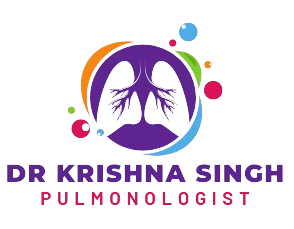
LUNG CANCER
Lung cancer is a type of cancer that begins in the lungs. It is one of the most common and serious types of cancer. Lung cancer occurs when cells in the lung grow uncontrollably, forming a tumor. These cancerous cells can interfere with the lung’s primary function of delivering oxygen to the bloodstream and removing carbon dioxide.
Dr. Krishna Singh is widely recognized as the best Pulmonologist in Bhopal for the treatment of lung cancer. With his extensive expertise and commitment to patient care, Dr. Singh offers comprehensive and personalized treatment plans for lung cancer patients. From early diagnosis to advanced treatment options, Dr. Singh ensures that patients receive the highest standard of care to achieve the best possible outcomes.

TYPES OF LUNG CANCER
Non-Small Cell Lung Cancer (NSCLC): This is the most common type, accounting for about 85% of cases.
It includes several subtypes:
- Adenocarcinoma: Often found in outer parts of the lungs.
- Squamous Cell Carcinoma: Usually starts in the central part of the lungs.
- Large Cell Carcinoma: Can occur in any part of the lung and tends to grow and spread quickly.
- Small Cell Lung Cancer (SCLC): This type accounts for about 15% of lung cancers and is more aggressive. It often starts in the bronchi and grows rapidly, usually spreading to other parts of the body by the time of diagnosis.
CAUSES AND RISK FACTOR
Smoking
The leading cause, accounting for about 85% of cases. Both smokers and those exposed to secondhand smoke are at risk.
Radon Gas
A natural radioactive gas that can accumulate in homes and buildings.
Asbestos
Exposure to asbestos fibers, often in industrial settings, increases the risk.
Air Pollution
Long-term exposure to air pollution can increase the risk.
Family History
Genetic predisposition can play a role.
Other Factors
Exposure to certain chemicals, previous radiation therapy, and certain lung diseases can also contribute.
DIAGNOSIS
- Imaging Tests: Chest X-rays, CT scans, PET scans, and MRI.
- Biopsy: Taking a sample of lung tissue for examination.
- Sputum Cytology: Examining mucus from the lungs under a microscope.
- Bronchoscopy: Using a thin tube with a camera to view the lungs and take samples.
TREATMENT
Surgery
Removing the tumor and some surrounding tissue.
Radiation Therapy
Using high-energy rays to kill cancer cells.
Chemotherapy
Using drugs to kill cancer cells throughout the body.
Targeted Therapy
Drugs that target specific abnormalities in cancer cells.
Immunotherapy
Boosting the body’s immune system to fight cancer.
Frequently Asked Questions (FAQs) about Lung Cancer:
The primary risk factors include smoking, exposure to secondhand smoke, radon gas, asbestos, and other carcinogens, and a family history of lung cancer.
Early detection is challenging because symptoms often appear in advanced stages. However, screening methods like low-dose CT scans can help detect lung cancer early in high-risk individuals.
The prognosis depends on the stage at diagnosis. Early-stage lung cancer can often be treated successfully, while advanced-stage lung cancer may require more complex treatments to manage the disease.
Treatment options include surgery, radiation therapy, chemotherapy, targeted therapy, immunotherapy, and palliative care, tailored to the specific type and stage of lung cancer.
Quitting smoking, avoiding exposure to secondhand smoke and carcinogens, testing your home for radon, and following a healthy lifestyle can reduce the risk.
Dr. Krishna Singh offers expert diagnosis, personalized treatment plans, and compassionate care, making him the best choice for lung cancer treatment in Bhopal. His extensive experience and commitment to patient well-being ensure the highest quality of care.
